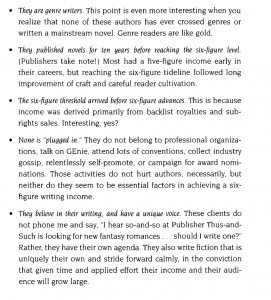The common wisdom is: if you publish in the genre, go to conventions. Here:
Now, to clarify (because this has bitten me in the ass before) I’m quoting Kameron Hurley to talk about her assertion, not to blindly agree with it.
I’m going to relink the article she’s linking above because it’s worth reading, and I’m going to quote it, too.
Check this part out:
Here’s another wrinkle: at least in SFF writerdom, there is really no meaningful distinction between friends and colleagues. Which, sure, is true of a lot of fields. But these relationships are particularly close, and the professional utility of these friendships can be very high. There are costs to missing out, to not being at the right place at the right time to meet the right person. Missed connections are a real thing. Because here’s another wrinkle: it’s not just about being talented. It’s about being noticed.
Which calls back to some other, previous posts of mine about luck. (Don’t roll your eyes, people, I’m going to be brief this time.) If you maximize your interactions with other people and with new experiences, and you remain open to new opportunities, you increase your chances of a “lucky” break. That’s why people who say you can’t control luck are wrong. You can’t control luck in any specific situation, but you can increase the chances that something lucky will happen over the long term.
Therefore: conventions, where you meet colleagues who become friends. The benefits of that are unpredictable but they’re there. The costs are there, too.
See this post by Chuck Wendig listing the upside and downside of attending. As Chuck says, the point is to meet people you like and be liked in return. It’s a professional opportunity to make pals, not to cynically acquire names and resumes who will give your career a lift. Chuck also makes an extensive list of the downsides, one of which is cost. Marko Kloos broke down the cost of attending Confusion, an event he really enjoyed and which is apparently the cool new thing.
Clearly, $1,888 isn’t chump change, and it’s clear that no one is going to make back that money on the weekend itself. The money I just paid to Bookbub was not tiny, but the extra sales more than made up for the cost. But that’s short-term thinking. That almost-nineteen hundred dollar ConFusion expenditure will pay off, if it pays off at all, in the long-term benefits that come from the friendships formed at the event.
For example: we’ve all seen writers pushing their books on social media, and most of us know that, while it works once in a while, it’s not an effective way to sell. You reach your core followers, they buy the book, and the positive effects of future promotion nosedives.
But being promoted by other writers to their followers, with a personal recommendation? That’s gold. Meeting an editor who remembers you as smart, funny, and sensible the next time your agent submits your work? Making a good impression on a handful of fans who decide to try your books, then love them so much that they evangelize for them? Also gold.
And it can’t be predicted or forced. It’s like the old saying: “If you want to find someone to love, be someone worth loving.” Authors just have to go, spend the money, the energy, and the time, and hope good comes of it.
For those who have found benefit that way, great. I’m glad Kameron Hurley’s career is doing well and I hope she becomes a best-seller (or whatever her goal is). But it’s important to be wary of Survivor Bias. My own experience at big meetups is not all that positive. Usually I leave feeling that I should have spent that time writing.
And then there’s this:

Excerpt from ‘The Career Novelist’ by Donald Maass
That advice is more than 20 years old and it’s the exact opposite of what authors are told now. Conventions may have been around for a long time, but could things have changed so much?
I’m open to the possibility that social media magnifies the effects of creating a F2F friendship with your colleagues; it’s possible that folks who witness fun and funny online exchanges between pros would be willing to sample the work of a whole clique. I also suspect that’s where “cool kids” rhetoric comes from (as in “I’ll never be one of the cool kids”). In social media, casual expressions of camaraderie are a public act and it’s easy to feel excluded when it looks like everyone but you gets to take part in the fun (Not to mention getting the reviews, the blurbs, the nominations…)
Then again, what looks widespread and pervasive on social media is usually neither. The ongoing drama in one person’s circles goes completely unnoticed by the world at large. And those people that look like they’re among the “cool kids” are struggling with their books and their insecurities just like any other writer. The only difference is that their circle of friends has a high(ish) profile.
Still, the idea that long-lasting sales comes to those who don’t waste time on the social stuff is very very tempting.
Back and forth. Back and forth. Is it worth the time and money? How many cons does it take to start making friends? Is it even worth it for me, a guy who hates to be jostled, who can’t hear in noisy environments, and is terrible at recognizing faces? (also names?)
Maybe it would be worth it, but feh. I’m terrible at that stuff. We only get 52 weekends a year, and I don’t want to use one of mine on socializing when I could be working on a book.
I could be shooting myself in the foot with that decision, but it wouldn’t be the first time.
Like what you just read? Please share!

